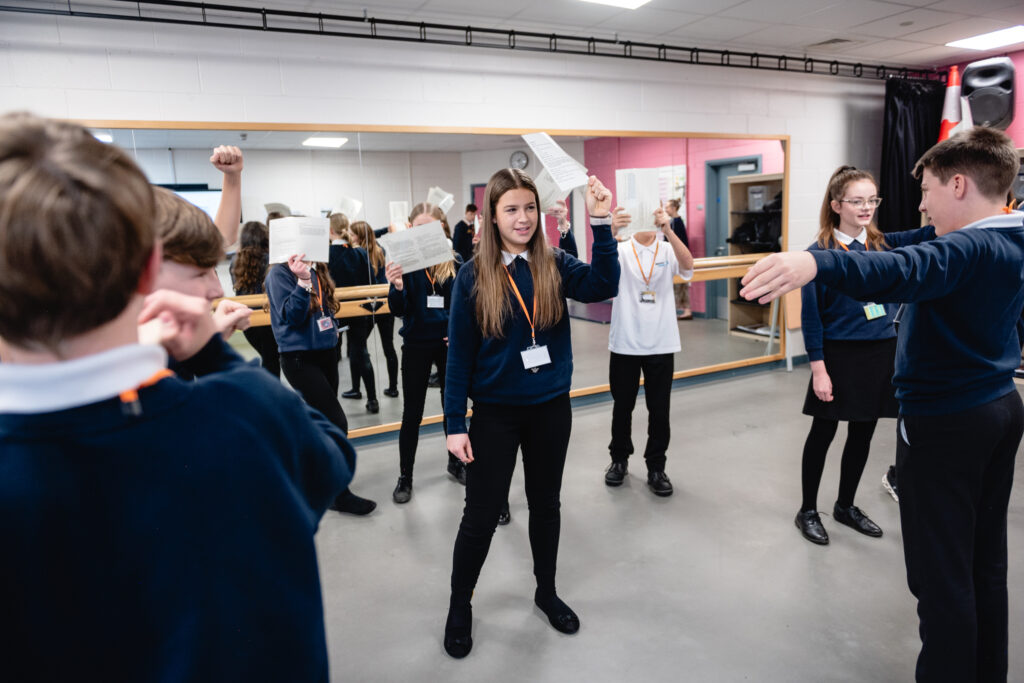Performing Arts will ignite a creative spark and develop students confidence to perform, create and analyse meaningful and imaginative performances.

The intent of Performing Arts at Beckfoot is to nurture enjoyment and understanding of the Performing Arts through practical experience. We aim to develop subject specific and transferable skills that challenge and empower learners, building their confidence by fostering a creative approach to express themselves and their opinions on the world around them.
Confidence, creativity and communication are at the heart of every lesson. Our subject gives learners the opportunity to explore themes and issues deeply and reflect on their work – looking at and from alternative perspectives.
Enrichment
Our curriculum gives students the opportunity to explore social and cultural issues and create theatre that tackles issues within their community. Learners develop emotionally and socially through theatre trips, extra-curricular enrichment, professional workshops and deeper learning days. These experiences inspire learners to think ‘beyond Beckfoot’ and have an appreciation for the local, wider, national and international community.
Assessment
In years 7, 8 and 9, internal assessments will take place throughout each year to monitor student progress and further inform teaching and learning.
At GCSE, students will be assessed through both examinations and non-exam assessments.
KS4 Specification
Careers
Our curriculum ensures learners are prepared for life in the 21st century through developing transferable skills such as communication, oracy, analytical thinking, reflection, independent study, research and project planning. Learners develop knowledge of roles and responsibilities in the Performing Arts industry while building their confidence, creativity and resilience to fulfil their life goals and succeed in all areas of employment.
Curriculum Overview
| Year | Cycle 1 | Cycle 2 | Cycle 3 |
|---|---|---|---|
| Year 7 | Superheroes: Students will be introduced to key physical skills to develop and perform their own superhero character as they devise a scene using techniques such as role on the wall, improvised role play, slow motion movement and dialogue. | Bollywood: Students are introduced to the key dance performance skills to learn and perform a Bollywood routine – they will choreograph their own group dance using Bollywood dance movements and devices such as formations, levels, direction, cannon and unison. | Charlie and the Chocolate Factory: Students will be introduced to key vocal skills through performing the Charlie and the Chocolate Factory script, they will explore the script using techniques like roleplay, tableaux, thought-tracking, hot-seating and cross cutting. Students will take part in a final performance incorporating all the skills learnt in Year 7. |
| Year 8 | Film Trailer: Students will use their stagecraft and performance skills to perform a film trailer – they will devise their own trailer to advertise to the audience, using techniques such as physical theatre, direct address, voice over, montage and slow motion. | Melodrama and pantomime: Students will be introduced to the conventions and techniques used in melodrama and pantomime using techniques such as direct address, asides, mime and slapstick comedy. | Romeo and Juliet: Student will use their stagecraft and performance skills to stage key scenes from Romeo and Juliet including the prologue, a soliloquy and a fight scene, as they explore techniques to communicate mood and atmosphere through different styles. |
| Year 9 | Acting techniques in realism: Students will be introduced to the theatre practitioner Stanislavski as they use techniques such as off-text improvisation, given circumstances, Magic IF, levels of tension and the leading technique to rehearse and perform a dialogue. | Noughts and crosses: Students will be introduced to the theatre practitioner Brecht, as they use techniques such as montage, narration, direct address, multi-role, placards and gestures to develop a performance of scene from Noughts and Crosses. | Devising from a stimulus: Students will use their knowledge and skills from KS3 to devise their own performance in response to a stimulus in the style of Documentary Theatre, they will gain experience of working as a Theatre Company, considering their purpose, creative intentions and target audience. |
| Year 10 | Performing from a text – introduction (DNA): Students will build on their skills from KS3 through exploring a new play text, DNA. They will develop relationships, trust and confidence in their new class. | Pantomime Performance: Students will work as a class to rehearse and perform a pantomime to Year 7 and 8 and analyse their performance in an evaluation. | Devising Theatre (The Paper Birds – stimulus mock): Students will be introduced to the theatre company The Paper Birds and their verbatim theatre techniques, as they apply their conventions to a scene influenced by a stimulus. |
| Year 11 | Component 1 Performance NEA: Students perform their final component 1 performance in response to a stimulus and in a style of their choice. | An Inspector Calls (Act 1 & 2) Context, lighting and set design: Students build on their knowledge of An Inspector Calls, interpreting the text from the perspective of a Director, Actor and Designer, while developing their essay writing technique. | An Inspector Calls (Act 3) Sound and Costume Design: Students build on their knowledge of An Inspector Calls, interpreting the text from the perspective of a Director, Actor and Designer, while developing their essay writing technique. COMPENENT 3 EXAM |